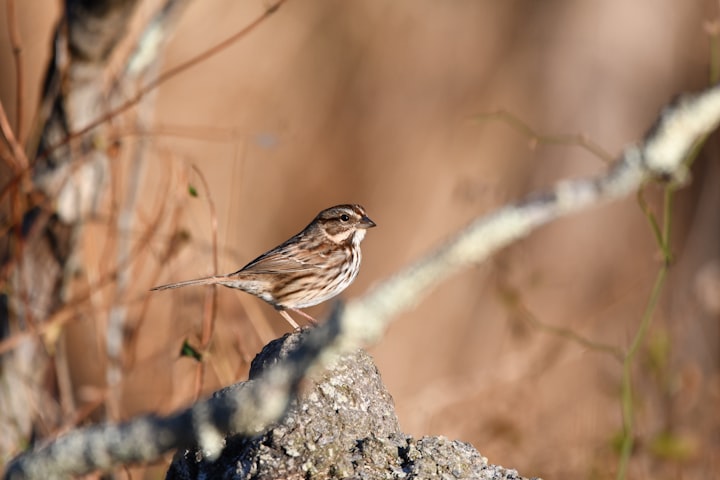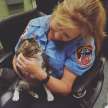The Injured Sparrow
A grandmother tries to keep her loved ones together with art.

Whenever Bea would enter a conversation circle, the established members of said circle would appear, to an outside observer, to have suddenly contracted a painful abdominal malady. Their faces would contort into stalwart displays of suppressing a newly discovered sour taste or uncomfortable sensation in their stomach to the best of their abilities while trying not to call obvious attention to their communal distress. It was the epitome of polite society to do so. After all, Bea was family.
People who were not bound by the unwritten familial contract would normally disperse immediately upon the arrival of the foul-mouth spinster, if they knew what was good for them. Most learned quickly enough.
Beatrice Bartlett was often willfully ignorant, not particularly attractive, and she had some hygiene issues but the main reason people didn’t like her was that she was, well, mean. She knew how to hone in on the one thing that made you uncomfortable and she’d bring it up again and again.
You could be talking about the weather in Australia with Uncle Joe and Aunt Barb but Bea could somehow find a way to bring up infertility into the conversation and make it seem like a personal failing. No one knows how she figured out that Jeff had an affair with his coworker but the way Bea always zeroed in on workplace romance had the rest of us putting two and two together as to why we no longer saw much of his wife, Carol.
Bea also thought quite highly of herself. Her viewpoint on whatever topic was on hand demanded consideration and she would insist on drowning out whatever the current consensus was. She was also adept at steering discussion towards sideline topics that interested her. Evidence of conspiratorial theories was a favorite. Governmental monitoring via implants came up frequently, as did an odd idea concerning shape-shifting reptilian humans that were part of a secret society wreaking havoc on the United States.
Gram always felt sorry for Bea, in much the same ways she’d care for an injured sparrow unfortunate enough to fly into a closed window. She would say Bea’s unpleasant personality was the result of an undiagnosed condition, no doubt. All the injured sparrow needed was a little TLC. Eventually, it would be good to go and fly off into the world.
Gram thought Bea was probably ‘slow’, or ‘mentally challenged’. This flew in the face of the clean bill of health the numerous physicians of body and mind had sent the perpetual hypochondriac home with.
Cousin Leon actually did have Asperger's, diagnosed at a young age to be eligible for special education. He managed through his adult life quite well, having obtained a technical degree, a good job, and a wife who was well-liked by the family. Gram loved and was, of course, very proud of Leon but she reserved her sympathies for Bea, who had somehow evaded the correct medical categorization that could have helped her as well, in her opinion.
Even Bea’s own mother had enough of her. Aunt Sue thought she’d given her daughter more than enough resources and preparation to establish herself independently when she moved south without her. Technically, Bea was 29 when Sue packed up and left for the over-55 community in a warmer climate. There was never any intention of taking her irritating daughter with her to the sunny relocation spot for active seniors. Bea resented her for leaving and rarely spoke to or of her mother after that. Abandoned, she’d say of the situation.
You might think the rest of the cousins would have seized on the opportunity to use this to our advantage when Bea became passive-aggressively insulting. “At least my mother didn’t run away from me,” Andrew made the mistake of uttering once. He was the adopted child of Aunt Barb and Uncle Joe, his non-genetic association to the family being pointed out by Bea at every opportunity. But the only thing worse than Bea being cruel was Bea feeling sorry for herself. Her long tale of persecution by her ‘floozy’ of a mother was far more exasperating, if that was possible.
Gram, of course, took her in. The injured sparrow never did leave. Bea didn’t contribute in any way the rest of us could discern. Gram did all the errands and the chores herself, all the while engaging in her semi-successful painting career. When Gram fell and was incapacitated for a while it was I and a few of the other cousins who rotated care duties along with a part-time nurse, paid for by the rest. Bea considered herself to be an ancillary patient at the time, adding items to the do-list carried out by the temporary nursing staff.
After a short career in banking, Gram retired early when her part-time hobby started producing a growing number of commissions, often from her well-heeled banking associates. Even when she was well into her 80’s Gram continued to paint for a small, regional, luxury hotel chain, creating artwork for the rooms and lobbies. Since Bea accompanied her at art events and unveilings it was assumed she was giving her some kind of allowance for the assistance.
There were some signs after Gram’s hip injury that her patience with Bea was wearing thin. She’d often make suggestions for the others to include Bea in our events and, heaven forbid, our vacations. Gram started to become less forgiving about Bea’s nasty remarks and would roll her eyes with the rest of us when Bea went off on her tangents. There were at least ten years between her hip injury and her eventual death that we wondered if Gram was trying to get Bea out of her life, or at least her home.
When our grandmother died, Bea was allowed to keep living in her house. In actuality, the house and its contents were supposed to be sold with the proceeds divided among the heirs but no timetable was given to do so. Somehow, Bea had the forethought and managed to afford a lawyer who argued that she was under no obligation to leave. We weren’t even allowed to enter the house without her permission.
Although Bea was the oldest of the grandchildren we figured she’d probably outlive us all out of pure spite. Whenever we found ourselves together after, we would joke that Bea was doing calisthenics and eating health food now, to ensure she kept everything.
One day, I received a call from a Mr. Dodworth. He introduced himself as the vice president of Travel Villas, the hotel chain Gram did much of her art for in her later years. He explained that he had some pieces for me and other members of the family.
“I was told to specifically ask for you,” he told me. “Your grandmother considered you to be the smartest of the grandchildren. I think that’s why you were represented as an owl.”
I didn’t know what that meant.
When I got to the hotel he specified, Mr. Dodworth took me to one of the hotel rooms. It had a sign on the door saying it was being renovated and not to enter.
“Your grandmother was a very prolific artist. There are some paintings she did for us that were only rented, so to speak,” he said before opening the door. “She allowed them to be displayed at our hotel but they were to be given to the rightful owners after her death. Offers have been made, but we were never allowed to sell them. Ms. Bartlett gave us your name for distribution.
“We’ve kept these paintings at different locations but they can only be fully appreciated while together, as a set. There are six sets, by the way, each one slightly different as to where the main bird is represented.”
He opened the door to a mostly empty room. On one wall, was a large painting of a pear tree with a large owl sitting in it. It was surrounded by nine smaller paintings. The smaller sections seemed to be parts of the same pear tree but with a different bird represented in each. It was brilliantly arranged. Each bird section stood out on its own as a beautiful piece. Only together could you realize it was part of a whole. The large middle section that represented the main pear tree almost resembled a bird if you squinted and looked at it from the right angle.
“You spotted it right away, didn’t you?” said an appreciative Mr. Dodworth.
“Yes,” I answered. “She has her wings wide open and is embracing all the birds.”
“Each bird is a different grandchild. Your names are written in the bark of the trunk, as I believe are all of your relatives. The pears in the tree have names and faces hidden in them too. They’re supposed to be your Bartlett ancestors.”
I couldn’t take my eyes off the magnificence of the whole collection. It was truly a monumental achievement. There were intricate details that could only be appreciated after long study of the individual elements. Those pears with the hidden faces that you could only find if you were looking for them and the branches that connected to the branches on the separate painting next to it, it was incredible.
I imagined my grandmother doing each of the paintings individually, only going by the memory of the main painting which had probably already been hung up in a Travel Villa hallway when she did the side paintings.
“You said there are six sets?” I asked. It seemed an unusual number. How was I to distribute them to the grandchildren? There were nine of us.
“Yes,” said Mr. Dodworth. “The recipients are written on the back. She left this note for you.”
"To Sondra, my wise owl,
"Please enjoy this work as it was intended, with all the pieces together. I originally started this for Andrew, to show him how we embraced him the same way we embraced all of the children. He has the first set. Leon also has his already.
"I made one for Bea but she has sold them, without even knowing what it really was. She has often tried to sell my work on her own. I know most of you already had issues with her so I didn’t say anything. She’s an injured soul. I don’t know how she came to be this way but she needed more than the rest of you. You are all strong and wonderful. I beg that you continue to involve her in your events and celebrations.
"Francis, bless his soul, purchased the set Bea sold and I gave him full restitution for what he bought it for, it's worth much more.
"I ask that you sell the final set and divide up the proceeds with the other grandchildren with the exception of Bea. She has benefited from my art so much already. She needs still needs care and I trust that you and the family continue to look out for her.
"Mr. Dodworth is prepared to pay you handsomely. It should be enough to help you all fly free to do the wonderful things you are all capable of, the things Bea can’t and never will. Please keep that in your thoughts as you try to understand why she does what she does. She only wishes she could be free and beautiful, like the rest of you.
"Be magnificent with love,
"Your Loving Grandmother."
I decided that Gram was right. We would include Bea in our celebrations. We would have her come to our homes and see the beautiful display of paintings our grandmother had made, the ones that had her represented as a small injured bird, unable to fly.
About the Creator
Nancy Gwillym
I'm a soon-to-be retired paramedic in NYC. I'm also a crazy cat/bird/etc lady who writes stories. Thank you for reading!






Comments
There are no comments for this story
Be the first to respond and start the conversation.